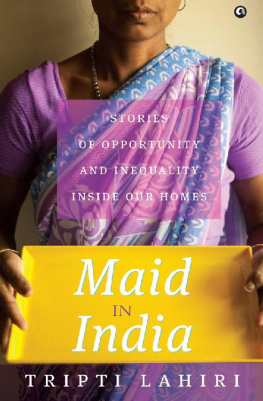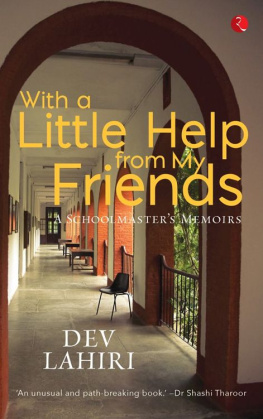Maid IN India
Maid IN India
STORIES OF INEQUALITY AND OPPORTUNITY
INSIDE OUR HOMES
TRIPTI LAHIRI
ALEPH BOOK COMPANY
An independent publishing firm
promoted by Rupa Publications India
First published in India in 2017
by Aleph Book Company
7/16 Ansari Road, Daryaganj
New Delhi 110 002
Copyright Tripti Lahiri 2017
All rights reserved.
The author has asserted her moral rights.
The views and opinions expressed in this book are the authors own and the facts are as reported by her, which have been verified to the extent possible, and the publishers are not in any way liable for the same.
No part of this publication may be reproduced, transmitted, or stored in a retrieval system, in any form or by any means, without permission in writing from Aleph Book Company.
ISBN: 978-93-84067-33-5
1 3 5 7 9 10 8 6 4 2
This book is sold subject to the condition that it shall not, by way of trade or otherwise, be lent, resold, hired out, or otherwise circulated without the publishers prior consent in any form of binding or cover other than that in which it is published.
For
Ma, Baba, Smita
CONTENTS
PART I:
Harvest
PART II:
Chore Bazaar
PART III:
The Sahibs
PART IV:
Madam
PART V:
Taking Care
PART VI:
Scene of the Crime
PART VII:
Snakes and Ladders
PROLOGUE
ONE RECENT NOVEMBER, I MET up with a handful of friends in Goa for the destination birthday celebration of one of our group. It was amazing that all of usworking and in our late thirtiescould make it. But then, it wasnt a very typical group. Only a few among us were married, even fewer had children. One of these few asked the birthday girl if it would be okay if she came with her three-year-old and live-in nanny in tow. This was a rare chance to spend time with both her friends and her child. Of course, said our host.
Before the Goa trip, our friend hadnt travelled a great deal with the nanny, although she often travelled overseas for work. Sometimes, if she was spending a chunk of time at a university with good day care, she would take her daughter; other times, on shorter research trips, her daughter and the nanny would stay home with her husband, a very involved father by any standard, while she travelled alone.
On our first night, reservations had been made at an elegant waterside restaurant. Initially, I and probably the others, with the blithe unconcern of the childless, imagined that nanny and child would remain at the hotel while the adults went off to eat at restaurants. But it was inconceivable to the mother to leave her child in a hotel while she went out. So, the nanny and the little girl, quiet and well-behaved, as little girls in India often are, came along with us.
Initially, I viewed this development with a trepidation formed by past observation. In todays India it is not unusual to see, often in largely empty restaurants, a couple seated with their child at a table for four, while the help is dispatched to sit not one but two tables away. Or, a nanny dandling a child on her lap at a nightclub while her employers and their friends drink cocktails as it creeps towards midnight, her hours of sleep dwindling since she is no doubt expected to be up and ready for another day at sunrise. Or, for example, amid children playing in a neighbourhood park, seeing a plump, light-skinned boy on a swing crook his finger at the petite darker woman standing nearby and utter a single word: Push.
I knew my friend to be progressive and well-intentioned, but now that I thought about it, had we ever met in situations where her ideals were under pressure, where I had to watch her decide between what was right and what was convenient? In any case, when it comes to domestic help, many progressive people have a blind spot. Professors who study and critique feudalism and the serfdom of rural peasants, underpay and overwork those very rural peasants when they hire them in the city as maids; feminists who are fighting the patriarchy nitpick and circumscribe the autonomy of their maids to such a degree that the maid becomes too nervous to proceed without asking a million questions, upon which she gets a scolding for being so irritating; as journalists, including those who cover strikes and the mistreatment of labour, we rarely stop to consider if our own homes are good places to workI doubt most of us could confidently say the answer is yes.
With a sinking heart I wondered if I was about to take part in the pageant that seemed to be increasingly emblematic of class relations in this new post-liberalization Indiain which one set of people sits eating and drinking overpriced western cuisine, an extravagance made possible by the wide array of opportunities, both legal and illicit, now available to themwhile another set of people, usually a great deal leaner, and in most cases female, sits apart from them, often before empty plates.
But it seemed my trepidation was unfounded. After a wander around the restaurant with her charge, the nanny joined us at the table. Our friend asked her to take a look at the menu to see what shed like to order. All seemed well. And then the next wave of guests arrived to join us.
Some of the guests were olderthe birthday girls mother and other relatives among themand suddenly it became clear to all of us that some serious seating management was going to be required. Nobody put it into words, but everybody there knew that many of the new arrivals would no more consider it appropriate to eat this celebratory meal while seated at the same table as the help than Lady Grantham of Downton Abbey would. Some of the older peopleand they were not so old, mind you, it was perhaps a generations differencewere of a time when camping meant having a servant sleeping at the doorway of your tent in case you should call for a bottle of water in the night. Their feelings werent unusual, it must be said: they were the norms of most elite Indians, including in my family.
We each tried in our own ways to rise to the occasion, to balance the competing demands of making welcome the nanny, a soft-spoken, educated woman from Jharkhand who bantered with her charge in English learned on the job, while at the same time not making our friends relatives, some of whom were hosting us, uncomfortable. Through a complex telegraphing of meaningful glances, us younger folks moved over to one end of the long table to sit with the nanny in order to allow most of the others to be separated from her by a cordon sanitaire of our own class. This seating arrangement allowed us to share with her the dishes that had been ordered for the whole table, without drawing too much unwanted attention to that breach in the class rules for dining in India: the help eats leftovers, and she eats later.
Meanwhile, at an adjoining table, the presence of a family of Russians sounded a helpful warning note about the perils of dining out with children sans nanny. Their children ran around noisily, climbing up the wooden poles that supported the thatched ceilings over each table hut, as the grown-ups, oblivious, chatted and drank copiously. Our child was a model of good behaviour, thanks to the shared ministrations of her solicitous caregivers. All in all, I was relieved by what seemed to me our exemplary handling of the situation: hadnt we quite fairly balanced our more modern sensibilities with the older folks class snobbery?












